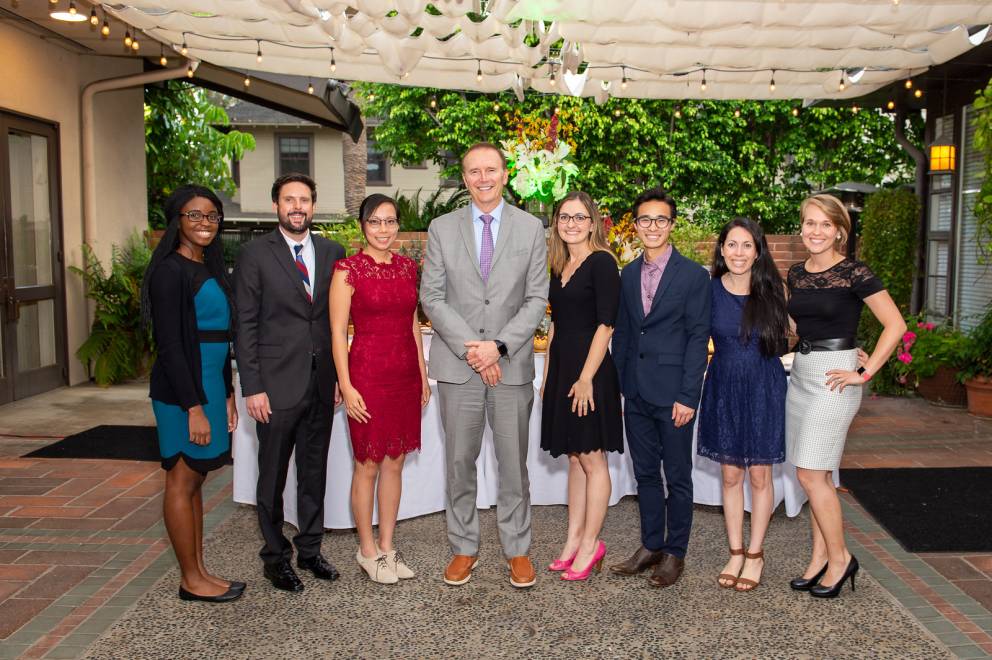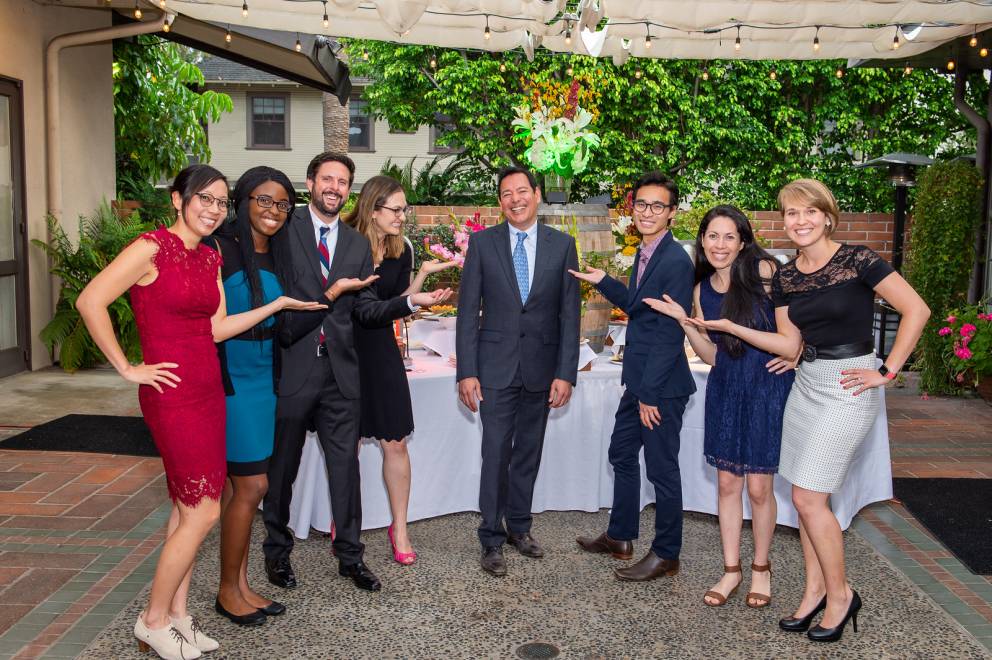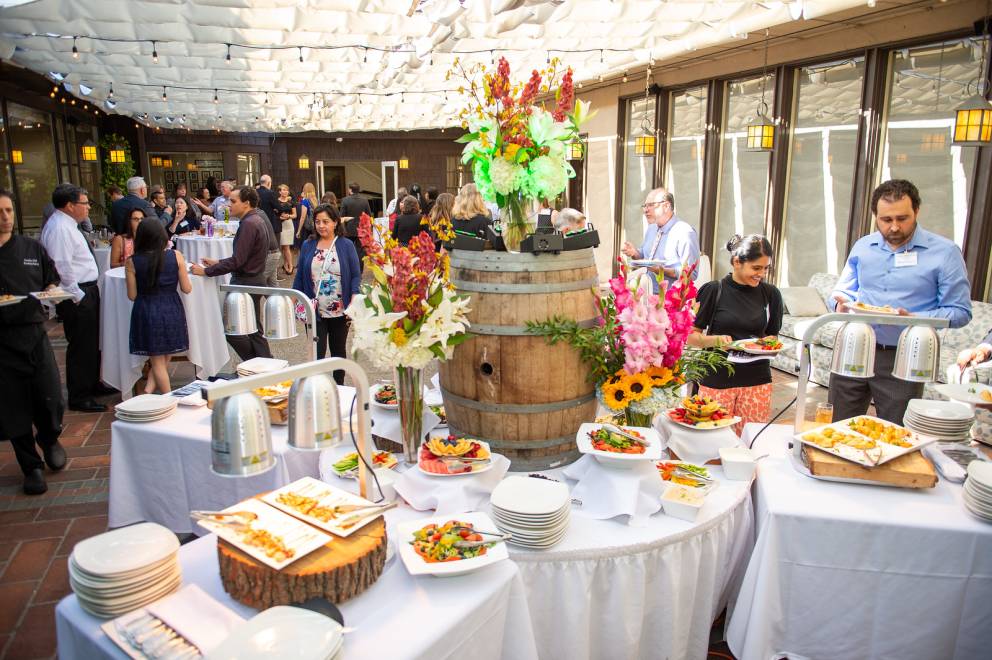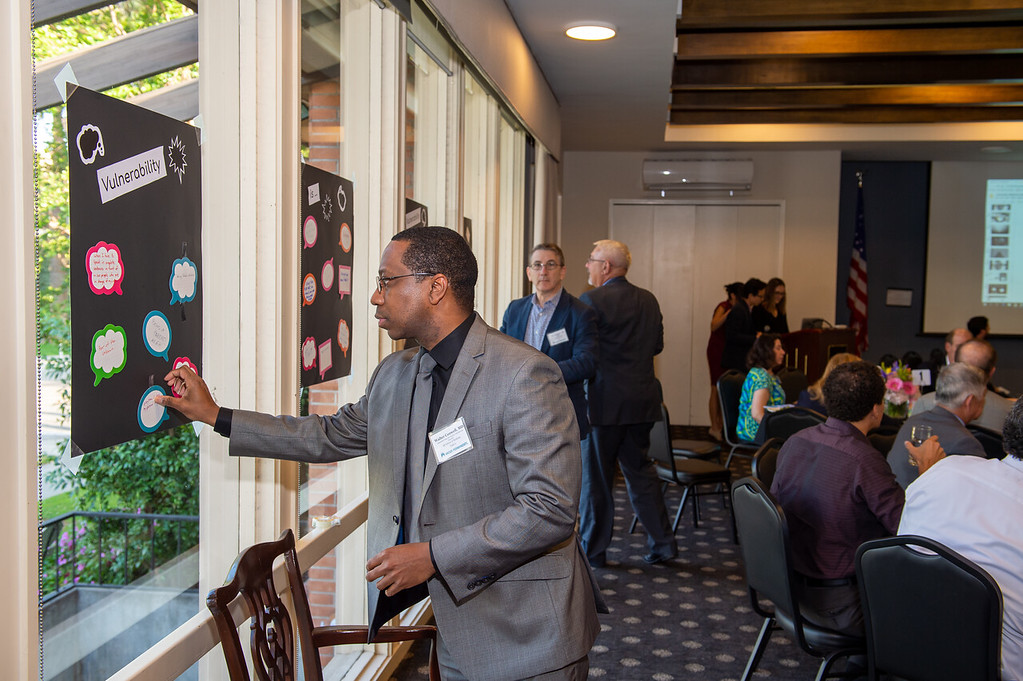
Edward Ellison, MD, executive medical director, Southern California Permanente Medical Group (center), celebrates with the 2019 Community Medicine Fellowship graduates.

The 2019 Community Medicine Fellowship graduates show their appreciation for Moises Cruz, MD, who is director of this Kaiser Permanente Southern California program.

More than 75 people attended the 2019 Community Medicine Fellowship graduation to acknowledge the fellows' year-long efforts to improve the lives of others and decrease health inequity.
‘Human Connection Creates a Healthy Community’
The 2019 class of Kaiser Permanente Community Medicine Fellowship graduates highlights how embracing vulnerability can improve health and well-being
Studies have long shown that people who feel socially connected are happier, have fewer health problems, and live longer. This year’s Kaiser Permanente Southern California Community Medicine Fellowship graduates highlighted how that power of human connection – of feeling heard, emotionally understood, and supported – can help promote health and healing.
During the 11th annual culmination on June 20 in Pasadena, the 7 young doctors explored how showing vulnerability, a quality needed for genuine connection, applies to community medicine and providing medical care to underserved populations. Over the past year, the fellows gained first-hand experience completing various projects throughout Southern California, from delivering vital care in homeless shelters and community clinics, to partnering with nonprofit organizations and schools to improve residents’ health.
“This year’s fellows have shown impressive dedication and drive. Collectively, they have set an intention to decrease health inequity.”
-- Moises Cruz, MD, program director, Community Medicine Fellowship
Quoting Brené Brown, a research professor and author of “Daring Greatly: How the Courage to Be Vulnerable Transforms the Way We Live, Love, Parent, and Lead,” the fellows defined vulnerability as uncertainty, risk, and emotional exposure. In the doctor-patient relationship, for example, the patient expresses vulnerability, sharing details about their physical, emotional, and mental health concerns. But connection is a two-way communication.
“We need to be vulnerable ourselves,” said fellow Duy Duc Nguyen, DO, a family medicine physician.
 To that end, the fellows shared their personal stories of vulnerability that helped shape who they are, and their interest in becoming doctors and reducing health disparities. Some graduates spoke about how they grew up without health insurance or came from poverty or a developing country. Others emphasized the challenges of their immigrant families and expressed appreciation for their parents’ sacrifices to give their children the best lives possible. The fellows also invited the graduation audience to voluntarily share instances when they feel vulnerable.
To that end, the fellows shared their personal stories of vulnerability that helped shape who they are, and their interest in becoming doctors and reducing health disparities. Some graduates spoke about how they grew up without health insurance or came from poverty or a developing country. Others emphasized the challenges of their immigrant families and expressed appreciation for their parents’ sacrifices to give their children the best lives possible. The fellows also invited the graduation audience to voluntarily share instances when they feel vulnerable.
Fellow Peifen (Sophia) Hu, MD, offered an example of how a doctor can make a difference in a patient’s life through human connection. A Chinese immigrant who didn’t speak English sought medical care for her painful headache. Initially uneasy, the woman began to feel more comfortable when to her pleasant surprise the doctor treating her spoke her native language. During the exam, the two chatted and laughed. By the end of the visit, the woman’s headache was gone.
“Turns out, the only medicine she needed was to speak to someone in her language and laugh,” said Dr. Hu, a family medicine physician, with a smile. “Everyone wants to feel seen, heard, and valued. Everyone matters.”
“Human connection creates a healthy community,” Dr. Nguyen said. “Being vulnerable can open new doors to healing.”
Dr. Cruz agreed: “Demonstrating vulnerability by sharing emotions can also benefit doctors, many of whom work long hours and suffer from burnout,” he said. Suicides among male physicians, for instance, are 40% higher than the general population, and among female physicians it’s a staggering 130% higher.
Edward Ellison, MD, executive medical director, Southern California Permanente Medical Group, closed the evening by acknowledging the fellows’ commitment to improving the lives of others and encouraging self-care.
“You truly are the gift we’re giving to the future, both inside and outside Kaiser Permanente,” Dr. Ellison said. “You are courageously authentic. Without caring, there is no community. Take that light and magic into the world – and never lose that passion and reason for being.”
Community Medicine Fellowship Impact
- Since the Community Medicine Fellowship began 11 years ago, 52 fellows have trained and graduated from the 13-month program funded by Community Health.
- The fellows who graduated in 2019 collectively saw and cared for over 10,000 underserved patients in 38 community clinics and completed more than 20 community-based projects.
- Each year, the fellows are instrumental in mentoring residents and medical students.
- Of this year’s 7 graduates, 2 will continue for a second year in the fellowship program; 3 accepted positions within Kaiser Permanente; 1 accepted a faculty position at a Los Angeles hospital; and 1 is actively seeking a position.
For more information about Kaiser Permanente Southern California Community Health, please visit community.kp.org.